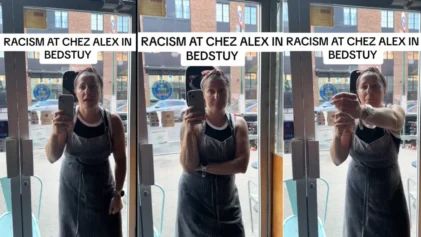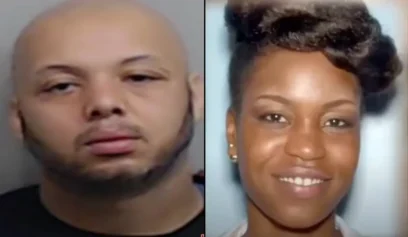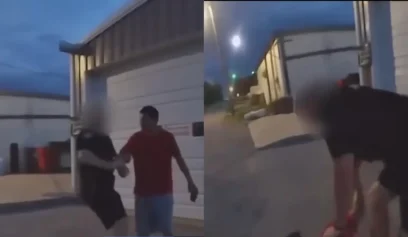George Bell is suing New York City and eight police officers after he spent nearly a quarter century in prison and faced the death penalty for a crime he did not commit.
Bell was convicted in the December 1996 slaying of an off-duty police officer and a business owner of a check-cashing store, a capital murder offense that Bell confessed to when he was arrested days after the killings. However, new evidence in the case pointed to other suspects, and Bell’s conviction was overturned in 2021.

Now Bell is asking to be compensated at least $50 million for the near quarter-century that he was behind bars for a mistake.
“Police and prosecutorial misconduct caused this tragedy,” the federal lawsuit obtained by Atlanta Black Star alleges. “The investigation, trial, and conviction of Mr. Bell were tainted by a coerced confession, the fabrication of evidence, and the withholding of voluminous Brady material that made it clear that a local robbery ring called “Speedstick” — not Mr. Bell — had committed the crime.”
There was political pressure to find a culprit in the slaying of the police officer. The officer, Charles Davis, worked security at a Queens check-cashing store owned by Ira “Mike” Epstein.
Former Mayor Rudolph Giuliani and police officials said they “would not rest” until they solved the double-homicide. Giuliani vowed to find those responsible for the Dec. 21 murder by Christmas.
Bell’s attorney, Richard Emery, said Giuliani was “pandering to tabloids and to the communities that he thought would back him up and elect him.”
“Crime was very serious [at] that time,” Emery said. “He was seeking to back a police force that was making…clearly false prosecutions based on bad police work.”
The New York Daily News ran a front-page story when Bell was apprehended. Just 19 years old at the time, the paper caught the teenager in tears at the police station and labeled him the “Crybaby Cop Killer.” The Daily News also ran a full-page editorial calling for Bell to be executed. The New York Post referred to a zoomed-in photo of Bell as the face of evil.
The New York Times reported an “intensive sweep throughout northwestern Queens” with “thousands of cars” stopped, “thousands of summonses” issued, and “hundreds of suspects” questioned.
Bell and two other Black men were arrested for the crime on Dec. 26, 1996, even though members of the Speed Stick gang had been wanted for committing similar robberies.
The NYPD posted wanted posters that described the suspects as three Black men about 5 feet 11 to 6 feet 3 and weighing 180, 185 and 190 pounds, respectively. Bell was 5 feet 10, weighed 150 pounds and had no criminal record. He was employed as a stocker at Old Navy.
Bell’s co-defendant, Gary Johnson, 22 years old at the time, also had no criminal record. Rohan Bolt was a 35-year-old owner of a local Caribbean restaurant, who had been charged with minor marijuana-related violations years before his arrest for the double murder, the suit alleges. He had never met Bell before then.
NYPD detectives narrowed in on Bell as a suspect after he was implicated in the crimes by a man known to authorities as a drug dealer, according to the lawsuit. Bell’s attorneys say the man who accused him was an acquaintance who knew his girlfriend had slept with Bell.
Police arrested John Bigweh for selling marijuana two days before Christmas while he was on probation for robbery and assault charges. Facing deportation to Haiti and under pressure by detectives over two days of interrogation, Bigweh told them Bell and Johnson asked for his help with the crime.
However, during a six-hour ride with one of the detectives, Bigweh’s account of the story changed several times with or without his involvement.
“[It was the] pressure and political environment that pressed the cops to pick a suspect who was a convenient suspect for them, but not the right one,” Emery said.
“And, of course, once they pick a suspect, they don’t look at anybody else. They were just single-mindedly focused on George. … They never let up, they beat George into submission and coerced a confession.
According to the lawsuit, Bell was sick and had just taken NyQuil before he got a phone call from Bigweh that tricked him into showing up at a police precinct to help a friend who’d supposedly been arrested.
When Bell showed up he was arrested himself and moved to another precinct, where his lawyers say he was interrogated by detectives and broke down after several hours of being threatened and beaten by the lawmen.
Detective Louis Pia allegedly yanked one of Bell’s braids, tearing hair from his scalp. Pia, who is named in the suit, told Bell that he would “put him in the f——— hospital” and pressed a hockey stick up against his neck and threatened to “use [his] head as a hockey puck,” the lawsuit says.
“Isn’t this police brutality?” Bell allegedly asked.
“No, this is how we get things done,” Detective Richard Sica allegedly said.
The detectives didn’t read Bell his Miranda rights and forced him to sign a paper waiving them. They denied his requests for an attorney and his mother, who had shown up at the precinct where he was arrested, only to be told by the officers on the scene Bell was not there and they didn’t know where he was.
Emery believes Bell’s conviction was motivated by racism.
“The racism of all of this was palpable and most assuredly the fact that most of the victims of false convictions, an overwhelming number, are Black men,” he said. “George was a victim of racial stereotyping at least, if not direct racial antipathy.”
There was no physical evidence that connected Bell to the crime. A witness who saw the suspects fleeing the scene and a jailhouse informant testified against Bell. The witness originally told detectives he could not provide a sketch of the person he saw because it “could have been anybody,” and he “didn’t want the wrong person to be picked up.”
The lawsuit alleges that the jailhouse informant relayed details that were already reported by the media, including erroneous reports, and he was also offered a chance to evade deportation.
The lawsuit accuses prosecutors of withholding evidence that could have pointed to Bell’s innocence, including proof that the NYPD had suspected the Speedstick gang of the crimes. One of the members also bragged about the robbery.
Bell’s public defender had made several unsuccessful attempts to obtain the evidence. The assistant district attorneys — in an apparently unconstitutional violation of procedure — denied the exculpatory evidence existed even after NYPD officials told the media the gang was connected to it in May 1997.
A jury convicted Bell of second-degree murder in June 1999. He escaped the death penalty and was sentenced to life in prison without parole. The other two men received 50 years each.
The judge who vacated the three men’s convictions in March 2021 said prosecutors’ handling of the case “leaves the distinct impression that the suppression of the [exonerating] information was not an isolated instance of misconduct, but part of a larger pattern of behavior that was calculated to deprive the defendants of fair trials, which is particularly egregious given that the death penalty was being sought against 19-year-old George Bell.”
The district attorney’s office dropped all of the charges against Bell three months later, and two assistant district attorneys who worked Bell’s case, Brad Leventhal and Charles Testagrossa, have since resigned.
Bell’s attorneys said they should have been “disbarred, suspended, or otherwise disciplined for their misconduct.”
“Bell suffered indescribable loss and agony as a result of the conduct of the police and the unlawful practices of the City,’ the lawsuit says.
In addition to $50 million, Bell is suing for punitive damages to be determined at trial.
“He’s a remarkable guy, but he has lost the lion’s share of his life, certainly more than half of it,” Emery said. “We’re asking for a big sum of money from the city for having railroaded him in ways that were outrageous because people at the time either knew, or clearly should have known, that he was innocent.”


